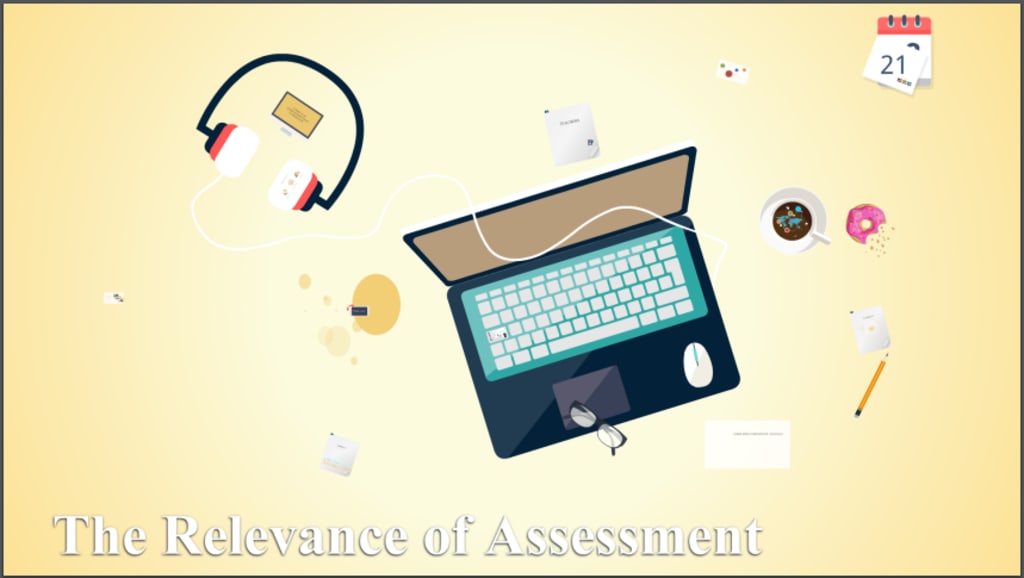The Relevance of Assessment: An Activity Output in Assessment of Learning
The relevance of assessment for students, parents, teachers, administrators/school officials, curriculum supervisor/program coordinator, and policymakers/legislators.

The Relevance of Assessment for Students

1. To be actively engaged in learning.
2. Take responsibility for their learning.
3. Serves as motivation.
4. Boosts their self-esteem.
5. To test if there are acquired knowledge, skills, and attitudes/values.
- This is true because an assessment task is aligned with the learning outcome.
6. Serves as an instrument to know their interests, strengths, and weaknesses (NCAE).
- So that students are aware if they are meeting the school’s standards.
- Note: NCAE stands for National Career Assessment Examination.
7. To know the current standing of the students.
- So that students are aware if they are meeting the school’s standards.
8. To monitor students improvement.
9. To identify the students’ strength and weaknesses.
- Many students are not aware of their strengths and weaknesses. It is up to their teachers to help them discover these through a pre-assessment.
10. To determine their special needs.
11. To serve as the basis for grade advancement and diploma.
12. To adjust teaching-learning practices.
13. To identify students’ learning successes and failures so that adjustment in learning can be made.
The Relevance of Assessment for Parents

1. Gives feedback on the child’s current performance.
2. Can be a basis for school preference,
- Yes, parents can select the best school for their children taking into account their strengths and interests.
3. Encourage the child’s strengths and interests in a particular subject.
4. Predict the career path of the child in the future.
5. This is usually through observation.
6. Detect a child’s learning disorders or special needs.
- Parents can detect if there is something wrong with their child. However, a formal diagnosis must be done by a qualified professional who can evaluate learning disabilities.
7. Provide appropriate rewards or consequences for the child.
8. Gauge the competency of instructions provided by the teacher.
9. Assessment informs students, teachers, and parents, as well as the broader educational community of achievement at a certain point in time in order to celebrate success, plan interventions and support continued progress.
10. This is why schools recognize student achievers.
11. Know the progress/status of my child.
12. Be aware if my child has learned anything.
13. Encourage kids to do better.
14. With high grades, praise and support them.
15. With subjects, they do not like or appreciate, help them focus.
16. Parent and teacher tandem.
17. Seeing the assessments helps the parents in Good parenting.
The relevance of Assessment for Teachers

1. It can tell what helps what individual students need.
- Formal needs assessment methods include critical incident techniques, gap analysis, knowledge, and skills test, observation, re-validation, self-assessment and peer review (Grant, 2002).
2. It can inform the teacher about what needs to be reinforced.
3. They can recognize special intellectual gifts in their students.
- Identify gifted learners.
4. Can help teachers know if they have done their job well and if the students have learned something
5. To identify students’ strengths and weaknesses, and provide recommendations for improvement to select appropriate assessment tools in view of students’ needs.
6. The teacher is able to participate in securing the formation of the values of the institution.
- Indeed, teachers develop among their students, not just knowledge and skills but also values formation.
The Relevance of Assessment for Administrators/School Officials

1. Undertake policy review and development at the school level.
2. For assessment of faculty performance.
3. Designate program priorities.
4. Identify the strengths and weaknesses of the curriculum.
5. Assist in decision-making about staffing and resourcing.
- Effective assessment and evaluation of the teaching staff are essential to the achievement of the school’s VMGO. Consider also other school resources to support learning. To serve as the basis for grade advancement and diploma.
The Relevance of Assessment for Curriculum Supervisor/Program Coordinator

1. Areas for improvement.
2. Reformations and amendments.
3. Relevance and needs.
4. Strengthening the curriculum.
5. Proper placing and sequence.
- This refers to the Dimensions of Curriculum Design -- Balance; Articulation; Scope and Sequence; Integration and Continuity (BASIC).
The Relevance of Assessment for Policymakers/Legislator

1. Providing assessment reports from stakeholders for policy review and development.
2. Reference in drafting public policies, laws, standards, and guidelines.
3. Guides CHED in monitoring quality assurance and compliance with PSGs.
4. The basis for recognition of programs and sanctioning schools with substandard programs, low or nor graduates, low passing rates in licensure examinations.

About the Creator
Domingo Añasco-Gaces Samontina, Jr.
.Professional Member of the Mechatronics and Robotics Society of the Philippines
.Certified Documented Information Controller with TUV Rheinland Qualifications
.Master of Science in Engineering (on-going) with Professional Teacher Certificate
Enjoyed the story? Support the Creator.
Subscribe for free to receive all their stories in your feed. You could also pledge your support or give them a one-off tip, letting them know you appreciate their work.






Comments
There are no comments for this story
Be the first to respond and start the conversation.